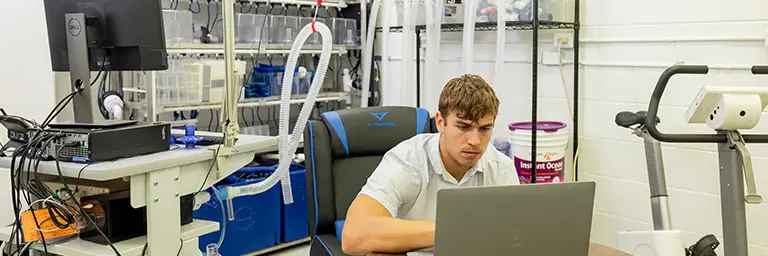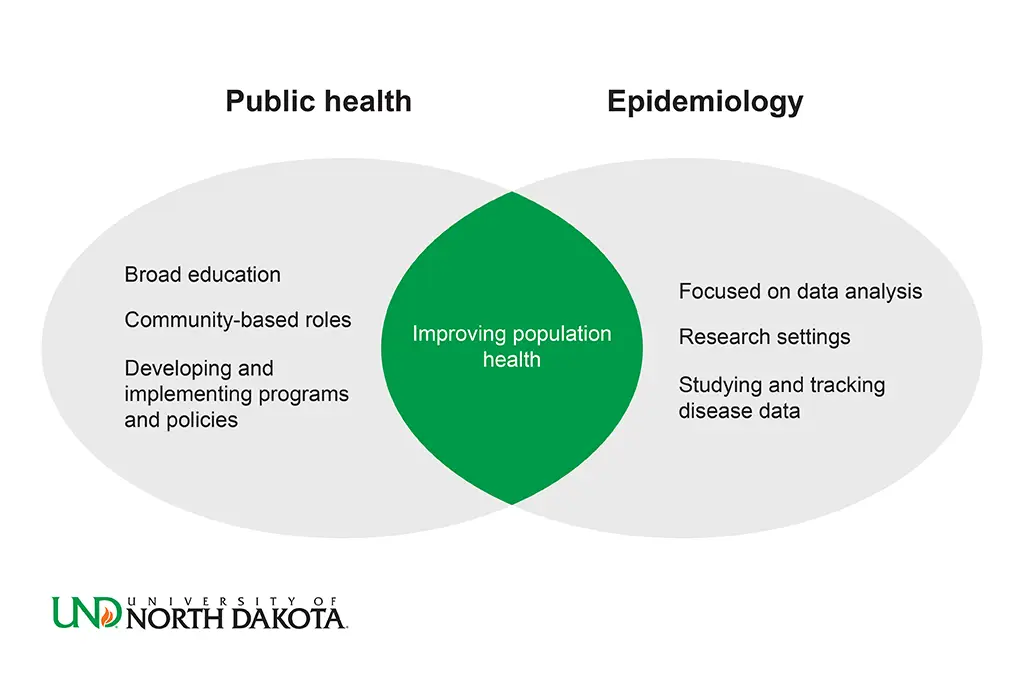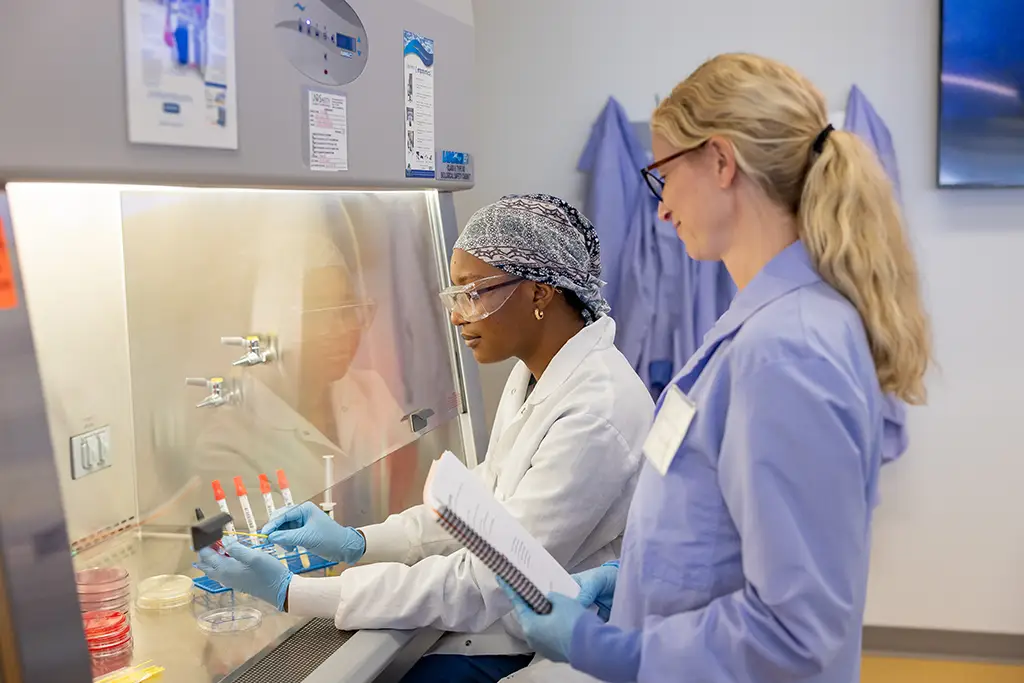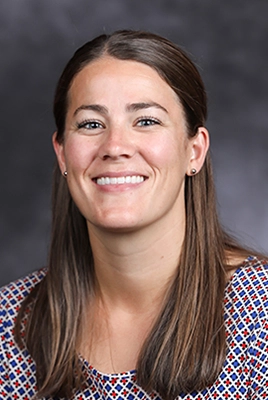
Public Health vs. Epidemiology
Reviewed by Ashley Bayne, MPH
Public health is focused on implementing policies and programs to improve community health, while epidemiology is centered on studying disease patterns and causes to inform those public health efforts.
Request Information
When we think about health, we often focus on personal wellness—maintaining a healthy diet, exercising, or managing stress. But health also operates at a larger level, where entire communities, countries, and sometimes even the whole world face the same challenges as we saw during the COVID-19 pandemic.
This community-level health perspective helps us understand why certain diseases spread, who is at risk, and how we can protect populations. Fields like public health and epidemiology are dedicated to studying and addressing these issues, ensuring that communities have the resources, data, and strategies needed to improve collective health outcomes.
"Epidemiology vs. public health" may seem like a simple comparison, but these fields are deeply intertwined, each supporting the other in essential ways. If you're considering a career in one of them, it's important to gain a solid understanding of each field independently, as well as how they intersect and differ.
What is Public Health?
Public health is the field focused on protecting and enhancing the health of communities through preventive measures and organized efforts.
Defined by Charles-Edward Amory Winslow, a seminal figure in public health, as "the science and art of preventing disease, prolonging life and promoting physical health and efficiency through organized community efforts," public health addresses many factors, from environmental sanitation and disease control to educating individuals on hygiene and ensuring access to healthcare services. Though from nearly a century ago, Winslow's definition remains highly relevant, reflecting public health's broad goal of creating conditions that promote health across society.
What is Epidemiology?
Epidemiology is the science dedicated to studying the distribution and causes of disease within populations. It's a scientific discipline within public health, often referred to as "the core science" of it.
This field dates back to Hippocrates' observation over 2,000 years ago that environmental factors influence disease. However, it was in the 19th century that epidemiology formally emerged, marked by John Snow's groundbreaking work linking cholera cases in London to a specific water source, which proved how diseases could cluster due to shared exposure.
Core Differences Between Public Health and Epidemiology
Public health and epidemiology are closely related fields within healthcare as they often go hand-in-hand. Still, each has distinct focuses, skill sets, work settings, and daily tasks that set them apart.

Education and Skill Sets
Public health education is quite broad and covers a spectrum of topics. The aim is to equip students with the skills and knowledge to address community health challenges on multiple levels.
UND's Bachelor of Science in Public Health Education and Accelerated Public Health Degree options focus on building foundational knowledge and essential skills for students entering the field. Along with the Public Health Minor and Public Health Undergraduate Certificate, these programs introduce students to subjects like health policy, environmental health, and social sciences, all necessary to understand public health fundamentals.
In addition, UND also offers advanced programs for those seeking specialization. The Master's in Public Health (MPH) degree, joint JD/MPH program, and Public Health Graduate Certificate offer targeted studies that help students develop skills in strategic planning, program implementation, policy analysis, and community outreach.
As a specialized field within public health, epidemiology benefits from a strong public health foundation but also requires more focused training in data analysis, statistical methods, and biological sciences. Epidemiology students learn to design studies, conduct disease surveillance, and analyze disease patterns within populations. Key skills in epidemiology include proficiency in statistical software, critical analysis, and understanding of disease pathogenesis.
Typically, an advanced degree, such as a Master of Science in Epidemiology or an MPH with a focus on epidemiology, is required for a majority of roles in epidemiology, often emphasizing biostatistics, infectious disease, and molecular epidemiology.
UND's Population Health Research & Analytics specialization is also an excellent option in this case. This specialization builds on the skills used in epidemiology—like data analysis and study design—while expanding into broader areas of population health. Through it, students gain practical skills in designing studies, analyzing population health data, and managing large data sets—all crucial for a career in epidemiology.
Workplace Settings
Public health professionals work in a variety of settings, including government health departments, non-profit organizations, community health centers, and international health agencies. They often work in policy-making or administrative roles, collaborating with community leaders, healthcare providers, and government officials to implement health programs and respond to public health emergencies. Settings can range from urban community centers to rural outreach locations and international organizations like the World Health Organization (WHO).
Epidemiologists are often found in research-oriented environments, including universities, research labs, government health agencies like the Centers for Disease Control and Prevention (CDC), and hospitals.
While some epidemiologists work in public-facing roles, many focus on data collection, laboratory work, or field research. They may also collaborate with healthcare providers to understand outbreaks or with government agencies to track disease trends, but still, their settings tend to be more research-focused compared to the community-oriented roles of public health professionals.
Daily Tasks
Public health professionals have a wide range of daily tasks depending on their specific role but generally focus on promoting wellness and preventing disease in communities. Common duties include:
- Tracking disease outbreaks and assessing public health data
- Developing and implementing health education programs
- Creating and enforcing policies to address community health issues
- Researching public health trends and risk factors
- Advocating for public health resources and improved access to healthcare
- Working with other organizations and local agencies to address health disparities
- Monitoring health outcomes and adjusting strategies as needed to improve population health
Epidemiologists have a more research-focused set of responsibilities. Their tasks often include:
- Designing and managing studies to investigate health issues
- Collecting and analyzing data to identify patterns and causes of diseases
- Interpreting data to recommend disease prevention and control strategies
- Communicating findings to health officials, policymakers, and the public
- Monitoring and tracking outbreaks of infectious diseases
- Evaluating the effectiveness of public health interventions
- Supervising research teams and managing study logistics

How Epidemiology and Public Health Work Together
Epidemiology functions as a foundational tool within public health. It supplies the scientific methods and data analysis needed to understand disease patterns, causes, and distribution. Therefore, public health relies on epidemiology to identify risk factors and map disease occurrence, guiding public health actions toward effective prevention and intervention measures. For example, early epidemiological studies, such as those on communicable diseases, have historically enabled public health to develop preventive measures, from sanitation improvements to vaccination programs.
By analyzing the natural history of diseases, epidemiology also helps public health professionals understand how diseases progress and which populations are most affected. With these insights, public health can develop targeted programs and policies that address specific needs within communities.
In a recent study presented by UND medical students on the rise of congenital syphilis ("A Public Health Scourge: The Recent Surge of an Ancient Disease" by Abigail Pleiss, B.S., Mikale Kuntz B.S., Selly Strauch, M.D., Susan Roe, M.D.), epidemiological findings highlighted the importance of prenatal screening and postmortem testing. Such data-driven insights allow public health professionals to implement screening and outreach efforts that address congenital syphilis at multiple stages, helping to prevent and manage its spread.
So, the relationship between epidemiology and public health is such that the former provides evidence and identifies health trends, and the latter translates all that information into actionable programs, education, and policy changes. Their shared goal is to ensure that public health efforts are grounded in scientific evidence and enable effective, efficient interventions that promote wellness and prevent disease on a population level.
Which Career Path is Right for You?
When choosing between a career in public health or epidemiology, take some time to think about what part of the health field you're most excited about and the types of roles you envision yourself in. Observe job descriptions for roles in both fields, looking at the day-to-day tasks and required skills. Additionally, getting hands-on experience in both areas, even through volunteering, can be a powerful way to see which environment feels right for you.
It's also helpful to consider the long-term impact you want to make. Though both are excellent options, public health roles often have a broader community focus, targeting overall health improvements. On the other hand, epidemiology is more specialized in understanding disease patterns to inform public health decisions. Each option is impactful, but understanding which specific contributions resonate with you can help guide your decision.
Conclusion
In a world without public health and epidemiology working in tandem, our ability to prevent disease and promote community wellness would be severely limited. Public health depends on epidemiology to provide data and insights, while epidemiology's findings achieve their true potential only when public health applies them through programs, policies, and interventions that protect communities. Each enhances the other's impact.
For those interested in pursuing either one and making a difference in their communities, UND provides excellent programs to help you succeed. So, join us, and our dedicated faculty and wealth of resources will support you every step of the way as you commit to creating a healthier and safer world.
FAQs
There are no bachelor's degrees in epidemiology, although it's possible for undergraduate programs to include epidemiology courses as part of a broader public health degree. Typically, aspiring epidemiologists pursue a bachelor's in public health or biostatistics.
The choice depends on your career goals; if you want to work directly in disease tracking and research, a master's in epidemiology might be ideal, but an MPH is better suited for leadership and policy roles within public health.
Yes, epidemiology is a key branch of public health. It provides essential data and methods for tracking and preventing disease.
The GPA requirements vary by program. However, it's always best to aim for a strong GPA, 3.0 or higher, in order to improve your chances of acceptance into more selective programs.

Ashley Bayne, MPH
Ashley Bayne serves as Assistant Director of the Public Health Program at the University of North Dakota School of Medicine & Health Sciences. She helped graduate students forge their paths in public health for over ten years. An experienced advisor and advocate for students and staff, Ashley become known for her ability to help others identify and achieve their passions. Ashley led university COVID-19 contact tracing efforts, mentored in the staff mentoring program, served as a board member of the Live Well Grand Cities health coalition, and managed teams in a variety of community-based projects. In addition to her primary position, she serves the field of public health through various university and community activities. Before her position at UND, Ashley held roles at Oregon Health & Science University, Rede Group, and the Oregon Health Authority.
Ashley earned a Master of Public Health degree from Oregon State University and bachelor's degrees in Community Health and Exercise Science from Concordia College in Moorhead, Minnesota.